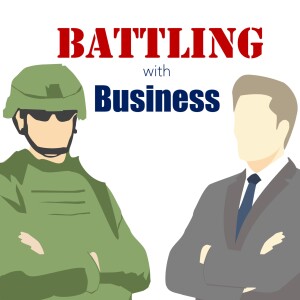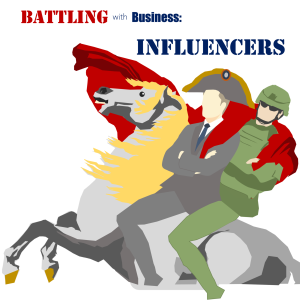Battling with Business
In this podcast, Gareth Tennant, a former Royal Marines Officer, and Chris Kitchener, a veteran of the software development world, explore ideas and concepts around teams and teamwork, leaders and leadership, and all things in between. It’s a discussion between a former military commander and a business manager, comparing and contrasting their experiences as they attempt to work out what makes teams, leaders, and businesses tick.
Episodes

Thursday Oct 09, 2025
Thursday Oct 09, 2025
In this episode of Battling with Business, Gareth Tennant and Chris Kitchener take on the challenge of Red Teaming, a structured way to challenge assumptions, stress test plans, and think like competitors or critics. They put the concept into practice by running a live exercise on air.
Listeners will learn why Red Teaming is different from everyday critique or boardroom debates, how it helps organisations avoid blind spots, groupthink, and overconfidence along with real examples from military operations, business transformations, and the COVID-19 crisis and then finishing up with a quick discussion about practical tools for applying Red Teaming in organisations of any size
Whether you are a CEO, team leader, or individual contributor, this episode will get you thinking differently about planning and resilience. Imagine a business where Red Teaming is a habit rather than a rarity. That's a business far better prepared for the unexpected!
Listen in to learn how Red Teaming can sharpen your strategy and strengthen your leadership.

Thursday Oct 02, 2025
Thursday Oct 02, 2025
Gareth Tennant and Chris Kitchener reveal the second half of the UK military’s seven-step planning model, and show how every business can boost resilience and performance with clear, communal frameworks.
This episode focuses on turning strategy into execution: allocating resources, orchestrating timing, defining coordination, and establishing practical control measures. The discussion tackles cross-departmental alignment, reporting cycles, culture, and learning how to manage through real-world complexity and unexpected change. Listeners will discover how the discipline of “chunked” planning and cascading communication connects even the most junior team members to the outcome.
If you’re serious about building agile, winning teams in any industry, don’t miss this practical, engaging conclusion to the Combat Estimate series, and walk away ready to apply a proven template for smarter, faster business execution.

Thursday Sep 18, 2025
Thursday Sep 18, 2025
Unlock the secrets of robust planning and flexible leadership by learning from both the battlefield and the boardroom.In the first episode of our exploration of the British military’s Combat Estimate, Gareth and Chris kick off a two-part deep dive into the UK military's renowned 'Seven Questions' Combat Estimate — a practical, repeatable approach for building resilient teams and effective management strategies.
This episode charts how military planning models, built for complexity and clarity, can transform business practices. Explore why a decision is better than indecision, and why planning is not just about the document but the discussion and alignment across every level. Key takeaways include the power of context, the importance of communicating intent, and the principle that adapting is winning — whether you're leading eight people or a thousand.
Don’t miss the engaging debate on why organizations often rush into execution over thoughtful strategy, and how adopting a repeatable planning framework can drive competitive advantage. Listen now for insights and prepare for Part 2, where Gareth and Chris unravel the remaining questions and reveal how every business can use the Combat Estimate to win in fast-changing environments.

Thursday Sep 11, 2025
Thursday Sep 11, 2025
Episode Summary: Dwight D. Eisenhower – Leadership Lessons for Business and Beyond
In this Influencers episode of Battling with Business, Chris and Gareth explore the leadership legacy of Dwight D. Eisenhower — Supreme Allied Commander during World War II and later the 34th President of the United States. Known for his calm authority and strategic thinking, Eisenhower shaped the course of history through coalition building, careful planning, and decisive action.
The conversation unpacks how Eisenhower managed complex teams, balanced powerful personalities, and made critical decisions under pressure skills as relevant to today’s business leaders as they were on the battlefield.
From military command to political leadership, Eisenhower’s legacy offers timeless insights into delegation, organisation, and building trust. Whether you’re leading a team, a business, or just looking to sharpen your decision-making, this episode reveals what modern leaders can learn from Eisenhower’s example.

Thursday Sep 04, 2025
Thursday Sep 04, 2025
Rerelease: Command, Leadership & Management
We’re taking a step back into the archive to revisit one of our most listened-to episodes of Battling with Business: our deep dive into command, leadership, and management.
In this conversation, Chris and Gareth unpack the often-confused but vitally important differences between these three concepts. Drawing on both military and business experience, we explore how they overlap, where they diverge, and why understanding the distinctions matters for anyone trying to get the best from their team. Crucially, we highlight why being clear about the differences is especially important in the military, where lives can depend on the balance between command authority, leadership influence, and effective management.
We look at questions such as:
What makes a good commander versus a good leader or manager?
Why do organisations so often blur these roles?
How can clarity improve performance in business, teams, and on the battlefield?
This episode is a straight rerelease — no edits, no new intro — just the original conversation as it was recorded, highlighting lessons on leadership and management that are as relevant today as when we first released it.

Thursday Aug 28, 2025
Thursday Aug 28, 2025
In this special episode of Battling with Business, Gareth and Chris are joined by Professor Damian O’Doherty, an academic at the University of Liverpool whose work explores leadership, organisational culture, and critical management studies.Together, they dive into the philosophy of leadership and management, exploring ideas like: Reconstructing organization: moving beyond modern vs. postmodern management thinking. Loungification of society: why our workplaces (and even leadership styles) might look more like lounges than factories.The myth of the heroic leader: why hero-worship in leadership can be dangerous and how bureaucracy might be due for a comeback.Ethnography in business: what we learn when we actually live inside the organizations we study.
This episode is less about practical frameworks and more about challenging ideas that shape how we see leadership today.

Thursday Aug 21, 2025
Thursday Aug 21, 2025
In this rereleased episode of Battling with Business, Chris and Gareth unpack one of the most important questions in business and leadership: what is strategy, really?
While many people mistake strategy for a plan, true strategy is something deeper. Strategy is the process of making decisions and allocating resources to achieve long-term goals under uncertainty and change.
✅ In this episode, you’ll learn:
The difference between strategy and planning.
Why uncertainty, risk, and competition make strategy essential.
How to connect vision, mission, and goals to strategic action.
Practical examples of strategy in business and the military.
🎯 Who is this episode for?Business leaders, entrepreneurs, managers, consultants, and anyone searching for clear answers to:
What is business strategy?
Difference between strategy and a plan
How to develop a strategy under uncertainty
Why strategy matters for long-term success
🔍 Whether you’re running a startup or leading in a complex organisation, this episode will give you a practical framework for understanding strategy as a living process — not a static document.

Thursday Aug 14, 2025
Thursday Aug 14, 2025
In this Influencers episode, Gareth and Chris shine a light on one of the most overlooked pioneers of leadership and management thinking: Mary Parker Follett. A radical voice from the early 20th century, Follett challenged the rigid, hierarchical models of her time and instead promoted collaboration, empowerment, emotional intelligence, and decentralized decision-making — decades before these ideas were popularized.
Gareth and Chris explore why her ideas were ignored, how they’re still relevant (and often misunderstood), and what lessons leaders can draw from her work in today’s AI-driven world. If you think “power with” sounds obvious, think again — Mary said it first, and it was revolutionary.

Thursday Aug 07, 2025
Thursday Aug 07, 2025
In this episode of Battling with Business, Gareth Tennant and Chris Kitchener are joined by Lieutenant Colonel Michael Harvey to explore how games—from ancient board games to modern war gaming and gamified business practices—can teach powerful lessons about leadership, decision-making, strategy, and team behaviour. They challenge the idea that games are childish or trivial and show how, when used properly, they become serious tools for simulating complex situations, developing strategy, breaking down biases, building trust, and improving communication. From role-playing games and corporate war gaming to gamified cybersecurity and leadership development, the trio dive deep into how games can help leaders and teams thrive in uncertainty.
If you think games are just for kids, think again.

Thursday Aug 07, 2025
Thursday Aug 07, 2025
In this rereleased episode of Battling with Business, hosts Chris and Gareth explore one of the most misunderstood areas of organisational strategy: the difference between mission, purpose, vision, and goals — and how they work together to drive business success.
What you’ll learn in this episode:
The true meaning of purpose in business and why it matters.
How a clear mission statement guides daily operations.
What a compelling vision looks like and how it inspires long-term direction.
How to set strategic goals that align with your purpose, mission, and vision.
🎯 Whether you’re a business leader, entrepreneur, manager, or consultant, this episode will help you:
Avoid common mistakes in strategic planning.
Align teams with a clear and motivating direction.
Build a strong organisational foundation for sustainable growth.
🔍 Perfect for listeners searching for:
“Difference between mission and vision”
“What is business purpose?”
“How to set strategic goals”
“Vision vs mission vs purpose vs goals”
“How to align business strategy”
This episode offers clear explanations, practical insights, and real-world examples to help you better understand and apply these key concepts in your own organisation.









